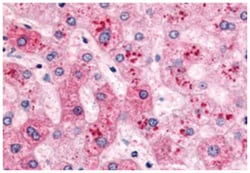Learn More
PYGL Rabbit anti-Human, Monkey, Polyclonal Antibody, Abnova™
Rabbit polyclonal antibody raised against synthetic peptide of PYGL.
Supplier: Abnova Corporation PAB28175
Description
This gene encodes a homodimeric protein that catalyses the cleavage of alpha-1,4-glucosidic bonds to release glucose-1-phosphate from liver glycogen stores. This protein switches from inactive phosphorylase B to active phosphorylase A by phosphorylation of serine residue 15. Activity of this enzyme is further regulated by multiple allosteric effectors and hormonal controls. Humans have three glycogen phosphorylase isozymes that are primarily expressed in liver, brain and muscle, respectively. The liver isozyme serves the glycemic demands of the body in general while the brain and muscle isozymes supply just those tissues. In glycogen storage disease type VI, or Hers disease, mutations in liver glycogen phosphorylase inhibit the conversion of glycogen to glucose and results in moderate hypoglycemia, mild ketosis, growth retardation and hepatomegaly. Alternative splicing results in multiple transcript variants encoding different isoforms. [provided by RefSeq
Specifications
| PYGL | |
| Polyclonal | |
| Rabbit polyclonal antibody raised against synthetic peptide of PYGL. | |
| In PBS (0.09% sodium azide) | |
| GSD6 | |
| Rabbit | |
| Immunoaffinity chromatography | |
| RUO | |
| 5836 | |
| Human, Monkey | |
| Liquid |
| Immunohistochemistry (PFA fixed) | |
| Unconjugated | |
| Immunohistochemistry (Formalin/PFA-fixed paraffin-embedded sections) (10 ug/ml) | |
| PYGL | |
| PYGL | |
| A synthetic peptide corresponding to 17 amino acids at C-terminus region of human PYGL. | |
| 50 μg | |
| Primary | |
| BLAST analysis of the peptide immunogen showed no homology with other human proteins. | |
| Store at 4°C. For long term storage store at -80°C. Aliquot to avoid repeated freezing and thawing. |
Your input is important to us. Please complete this form to provide feedback related to the content on this product.
For Research Use Only
